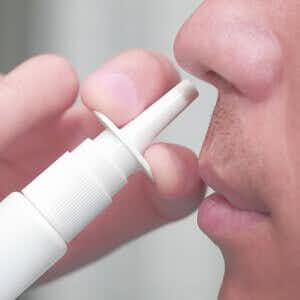
Allergy season makes millions miserable. They react to pollen and other allergens with nasal congestion, itchy watery eyes, sneezing and sniffling. No wonder so many people reach for a nasal spray.
Nasal Spray or Pills for Allergy Treatment?
A TV commercial for Flonase (fluticasone) is very appealing. A young couple and a beautiful dog are seen running through a forest. The announcer asks the question: “Are your allergies holding you back? Or is it your allergy pills?” The voice-over goes on to extol the benefits of Flonase Sensimist blocking “six key inflammatory substances.”
Does Flonase Have Side Effects?
There is no mention of side effects in this commercial. That’s because Flonase is now available over the counter. The FDA does not require a long list of adverse reactions in OTC drug ads.
Powerful steroid sprays have been used to treat allergies for years. Doctors prescribed medications like beclomethasone (Beconase AQ), budesonide (Rhinocort Aqua), fluticasone (Flonase), mometasone (Nasonex) and triamcinolone (Nasacort AQ).
Steroid Nasal Sprays Help Allergy Symptoms:
Such drugs are reasonably effective at calming allergy symptoms. That’s because these medications are corticosteroids and have substantial anti-inflammatory activity. Because they are sprays rather than pills, doctors worry less about the potential for systemic side effects.
That said, such drugs are not without drawbacks. The official prescribing information for Flonase before it went OTC included reactions such as headache, sore throat, nosebleeds and cough. Also included were: alteration or loss of sense of taste and/or smell, nasal septal perforation, glaucoma, increased intraocular pressure and cataracts, among other problems.
Nasal Spray and the Sense of Smell:
Readers of this column have reported complications of steroid nasal spray use. One reader shared this reaction:
“I used Flonase for about 10 days and then realized that my sense of smell and taste both had disappeared completely. My sense of smell had been very acute before that. I attribute the loss of my senses to the use of Flonase.
“Why doesn’t the manufacturer warn of the possibility of anosmia? Recently, I have the added annoyance of an ‘off’ taste with many foods. Why was it listed as a side effect on the prescription but left off the OTC medication?”
Nasal Spray and Vision Problems:
Anosmia (loss of the sense of smell) or changes in smell and taste are not the only problems people have experienced related to steroid nasal spray use. Several readers blame these sprays for causing cataracts. Here is one reader’s story:
“I am 55 and have been using fluticasone nasal spray year round since I was in my 40s. (In California, where I live, something is always blooming.)
“I was having vision problems. When I saw the ophthalmologist, she discovered I have a posterior subcapsular cataract. She kept asking if I’d taken steroids or had trauma to my eye. Finally I recalled that fluticasone is a corticosteroid.
“As I am generally healthy, I was shocked and could hardly believe that I have a cataract. My type of cataract is most commonly caused by corticosteroids or injury or irradiation to the eye for a tumor.”
Adverse Effects of OTC vs. Prescription Drugs:
Medications do not lose their potential to cause complications when they move from prescription to OTC, even if the commercials don’t mention scary side effects. To be a smart consumer, check with the pharmacist about possible adverse reactions to any drug before you use it.
You might also consider alternative ways to deal with your allergies. We have written about some of them here.

